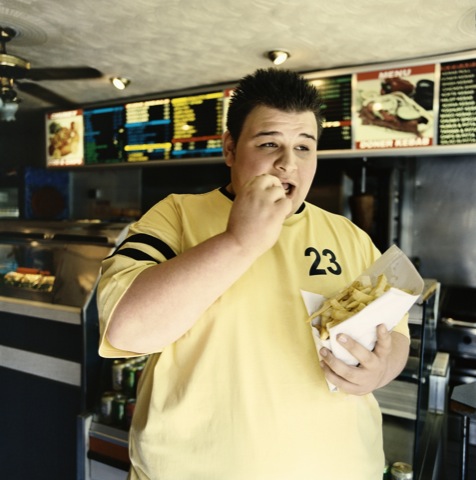Slide 1 of 4: Introduction
Author: Ronald J. Comer, Princeton University
Press the Next button to start this activity

Slide 2 of 4: 32.1 Eating and Weight Gain: A Role for Fidgeting
This video highlights various factors that may affect eating and weight gain (or loss), from heightened activity to conditioning to genetics. Watching the video you will see, for example, an experiment at the Mayo Clinic that subjects participants to a “slob regime,” in which they spend two months overindulging in food and engaging in no exercise. The results reveal that some individuals gain much less weight than others even though they have similar metabolic rates. As you will see, beyond genetic factors, the researchers discover that the thinner individuals actively fidget, or move unconsciously, much more than the average person.
Weight Gain: A Surprise Factor
I eat a lot of unhealthy food, Burger King, McDonald's, pizza. I love pizza. I will eat, and eat, and eat, and not do any exercise. And I don't have to.
I would rather sit on the couch, be a couch potato. I believe the most exercise I do is maybe changing a tape in the VCR, getting up to find the clicker to sit on the couch.
And yet, Jeff rarely puts on weight.
Why is it that some people appear to eat whatever they like and never gain a pound, whereas others just look at food and instantly gain weight?
Levine was determined to solve this mystery. So he recruited Jeff and 15 other game guinea pigs. For weeks, he collected precise measurements while subjecting them to a strict slob regime of masses of food and no exercise.
After two months of overindulgence, Jeff had only put on two pounds.
The only part that you could see that I gained weight was right here in my face, in my cheekbones and in my neck. And my pants got a little bit tighter, but nothing to worry about.
And what was incredible was that other people in the study gained eight pounds in body fat, showing a huge variation in fat gain between different people.
Levine started to work through his data. He knew it wasn't appetite, as they had all eaten the same amount of food. He knew it wasn't exercise. None of them had been taking it. When he looked at their basic metabolism, they were virtually the same. He just couldn't find an explanation.
And at that point, I actually e-mailed a friend and said, you know, I've done years of work. And we've found nothing. But then we started looking at the data that came from the non-exercise daily activity data. And then we'd struck gold.
Non-exercise daily activity is everything Jeff did that wasn't exercise. And this was the answer. Jeff couldn't put on weight because he couldn't keep still.
I am always fidgeting, moving my feet constantly, constantly tapping my feet. I touch my hands a lot. And I play with my thumbs a lot.
And I can't keep my hands off my face. I rub my hair a lot. Pretty much anything I'm doing, I'm moving. I just constantly move. I can't help it. I just move, move, move, move.
[PHONE RINGING]
But it's not exercise.
Hello? How are you doing?
Jeff gained almost no fat because he'd increased his general activity level completely subconsciously. Every time he noshes more, he starts to amble more. He starts to toe-tap more. He even starts to fidget more.
Levine eventually worked out how much food Jeff burnt off through all his fidgeting. It was a shockingly large amount, half his total calorie burn. Jeff was proof of just how important it is simply to move.
Slide 3 of 4: 32.2 Check Your Understanding
Instructions:
Answer the questions based on the video and your reading of the entire chapter.
Slide 4 of 4: 32.3 Activity Completed!
Activity results are being submitted...